Across Canada, more people are curious about microdosing psilocybin. From busy professionals looking for sharper focus to wellness enthusiasts seeking natural calm, the idea of taking a tiny, non-hallucinogenic dose of magic mushrooms has made its way from Silicon Valley circles to Canadian kitchen tables. But here’s the real question: are the benefits of microdosing psilocybin truly pharmacological, or mostly the result of the placebo effect?
The answer matters. Not just for skeptics, but for anyone considering adding microdosing into their wellness routine. Let’s dig into what science actually says.
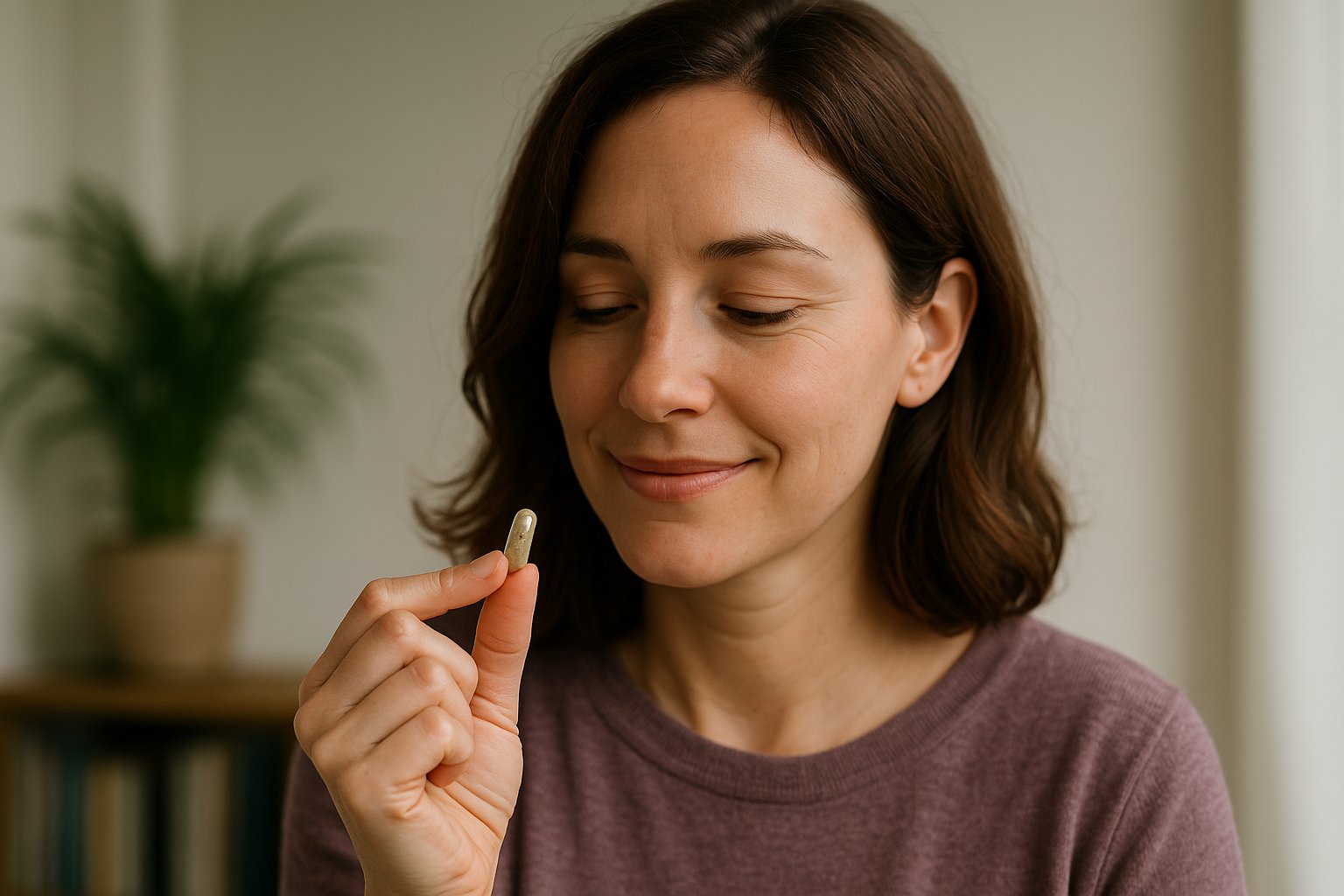
What is microdosing psilocybin?
Microdosing means taking a very small, measured amount of psilocybin mushrooms; often around 100 to 300 milligrams of dried Psilocybe cubensis. This dose is well below the threshold for hallucinations, meaning you stay clear-headed and functional.
At Path Supply, for example, our Elevate Mushroom Capsules contain pre-portioned 200 mg microdoses. These capsules give you consistency and convenience. No guesswork, no messy scales, just an easy addition to your wellness toolkit.
Supporters claim that microdosing can help with mood, focus, creativity, and even sociability. But do these microdosing benefits actually hold up under scientific scrutiny?
The case for benefits
Let’s start with what’s promising. Surveys and observational studies suggest that people who microdose psilocybin often report improved mental health and productivity. A 2022 Canadian study from UBC tracked nearly 1,000 microdosers over a month and found that they reported better mood, lower stress, and even small boosts in motor performance compared to non-microdosers.
The appeal is obvious: imagine starting your day with a cup of coffee and a tiny mushroom capsule, stepping into your morning meetings with sharper focus and a calmer mindset. No trips, no dramatic altered states. Just a subtle shift that supports daily life.
It’s easy to see why microdosing psilocybin has captured attention across Canada, especially among folks who value natural, evidence-based wellness approaches.
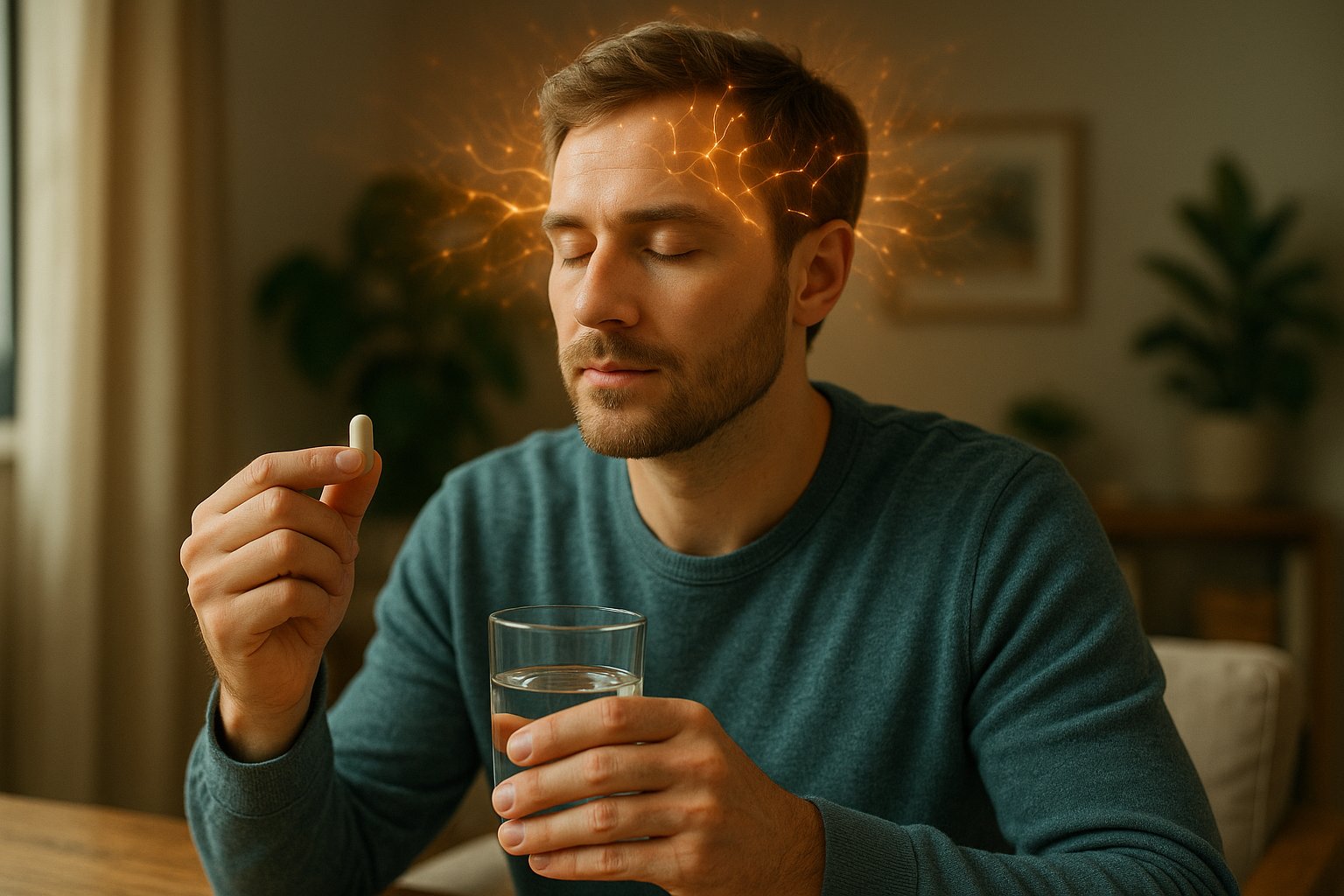
The placebo puzzle
Here’s where science gets interesting. When researchers tested microdosing in double-blind, placebo-controlled trials (where participants don’t know if they’re taking psilocybin or a sugar pill), the results were less exciting.
A 2022 University of Chicago study found that people given LSD microdoses reported no measurable improvements in mood or cognition compared to placebo. And a 2022 trial on psilocybin microdosing showed that while participants could feel subtle effects, there were no significant improvements in well-being or creativity compared to placebo.
In other words, some of the most rigorous science suggests the microdosing placebo effect plays a huge role. If you expect to feel more creative or balanced, you just might, whether or not the mushroom is doing the work.
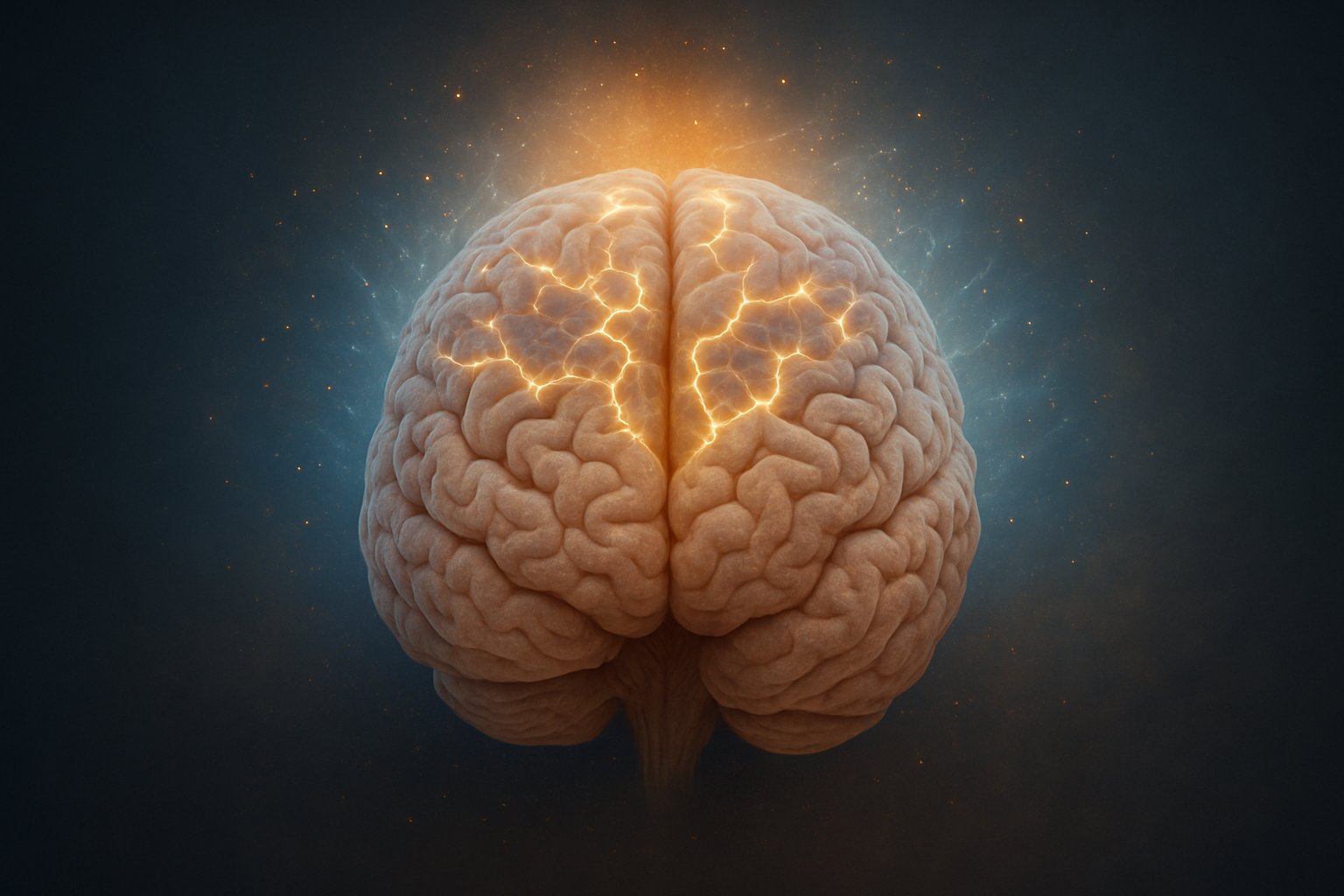
What’s really happening in the brain?
Psilocybin works by binding to serotonin receptors, especially the 5-HT2A receptor, which influences mood, cognition, and perception. At high doses, this interaction rewires brain networks in dramatic ways. Studies show it can even help people with depression reset entrenched thought patterns.
At microdose levels, the effect is far subtler. Brain imaging studies have shown small changes in brainwave patterns, but not enough to consistently translate into measurable benefits. What’s exciting, though, is that these tiny shifts suggest psilocybin still “nudges” the brain’s activity, and science is just beginning to explore how those nudges might add up over time.
Safe, subtle, and still evolving
So where does that leave Canadians curious about microdosing? The evidence so far suggests:
- It’s safe at low doses. Psilocybin is non-toxic and non-addictive, especially in microdosed amounts. Reported side effects are mild, like temporary anxiety or irritability.
- The research is still unfolding. More clinical trials are underway, especially in areas like depression and ADHD, to see if microdosing psilocybin has measurable therapeutic potential.
- asd
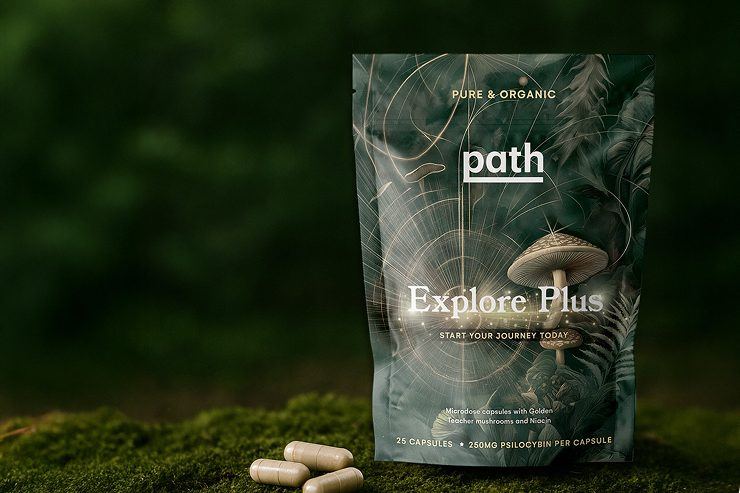
The bottom line: a mindful approach
For first-time microdosers and skeptics alike, it’s important to keep expectations grounded.
If you’re curious to explore, start small, stay intentional, and choose lab-verified products for safety and consistency. Our psilocybin microdose capsules and magic mushroom chocolates are designed to make that journey simple, safe, and accessible.
At Path Supply, we believe in curiosity backed by science. Whether its effects come from chemistry, psychology, or a mix of both, microdosing psilocybin offers a safe, mindful way to explore new paths to balance and creativity. Science is still evolving, but your journey can start today with curiosity, intention, and lab-verified products you can trust.
The world of mental health treatment is shifting. For decades, people living with trauma, depression, and anxiety had limited options, often daily medications with mixed results. Now, research into psychedelic-assisted therapy is sparking a new path forward. One of the most talked-about breakthroughs is MDMA-assisted therapy for PTSD, a treatment that’s showing extraordinary results in clinical trials. And here’s the exciting part: the progress with MDMA may open the door for psilocybin-assisted therapy, bringing “magic mushrooms” out of the shadows and into the medical mainstream.
At Path Supply, we’re passionate about sharing how science-backed psychedelics are reshaping wellness. Let’s explore how MDMA’s journey is carving a trail that psilocybin is ready to follow

Why MDMA therapy is making headlines
For over 30 years, the Multidisciplinary Association for Psychedelic Studies (MAPS) has been studying MDMA in combination with therapy for post-traumatic stress disorder. Their Phase 3 clinical trials were a turning point. In one study, nearly two-thirds of participants no longer met the criteria for PTSD after just three MDMA-assisted sessions with therapy, compared to about one-third in the placebo group. That’s an extraordinary result in a condition where many people don’t respond to standard treatments.
The therapy model looks different from what most of us think of as “medication.” Instead of a pill every day, patients undergo careful preparation, participate in guided therapy sessions while under the effects of MDMA, and then return for integration sessions. MDMA reduces fear responses and boosts empathy, helping people process traumatic experiences in ways that traditional talk therapy alone often cannot.
Although the U.S. Food and Drug Administration (FDA) requested additional data in 2024, optimism remains strong. Many experts expect MDMA to become the first psychedelic medicine approved in North America within the next few years.
The ripple effect: what MDMA means for psilocybin
So where do mushrooms come in? The progress of MDMA-assisted therapy for PTSD has created a scientific and cultural ripple effect. If MDMA (once considered purely a “party drug”) can move into clinics and win the trust of regulators, then psilocybin has a clearer path to follow.
Already, psilocybin-assisted therapy is showing promise. Clinical trials published in the New England Journal of Medicine found that a single psilocybin session led to rapid and lasting improvements in treatment-resistant depression. In fact, some participants experienced relief within 24 hours, with effects lasting weeks or even months.
The parallels are striking: both therapies combine a psychedelic substance with structured psychotherapy. Both offer more than symptom management—they aim for breakthrough experiences that help people reframe their struggles and move forward. And both are rewriting the story of what mental health care can look like.

Canada’s cautious but growing embrace
While MDMA and psilocybin remain controlled substances in Canada, there’s movement at the edges. Through Health Canada’s Special Access Program, physicians can request psilocybin or MDMA for patients with serious conditions when conventional treatments haven’t worked. Since 2022, hundreds of Canadians have legally accessed psilocybin therapy through this program, often for end-of-life anxiety, depression, or cluster headaches.
At the same time, Canadian researchers are leading global studies on psilocybin for depression, alcohol use disorder, and palliative care. As public opinion continues to shift, and with our neighbours to the south pushing forward, it’s hard to imagine Canada won’t expand access once approvals happen abroad.
Why this matters for the future of mental health
We’re standing at the edge of a new era in psychiatry. Instead of endless prescriptions, people may soon have access to psychedelic therapies that provide lasting change after just a few carefully guided sessions. For veterans with PTSD, for those with treatment-resistant depression, and for families seeking hope, these therapies could be transformative.
We believe that as research continues, the line between clinical and wellness use will blur, empowering people to explore mushrooms responsibly while science catches up.
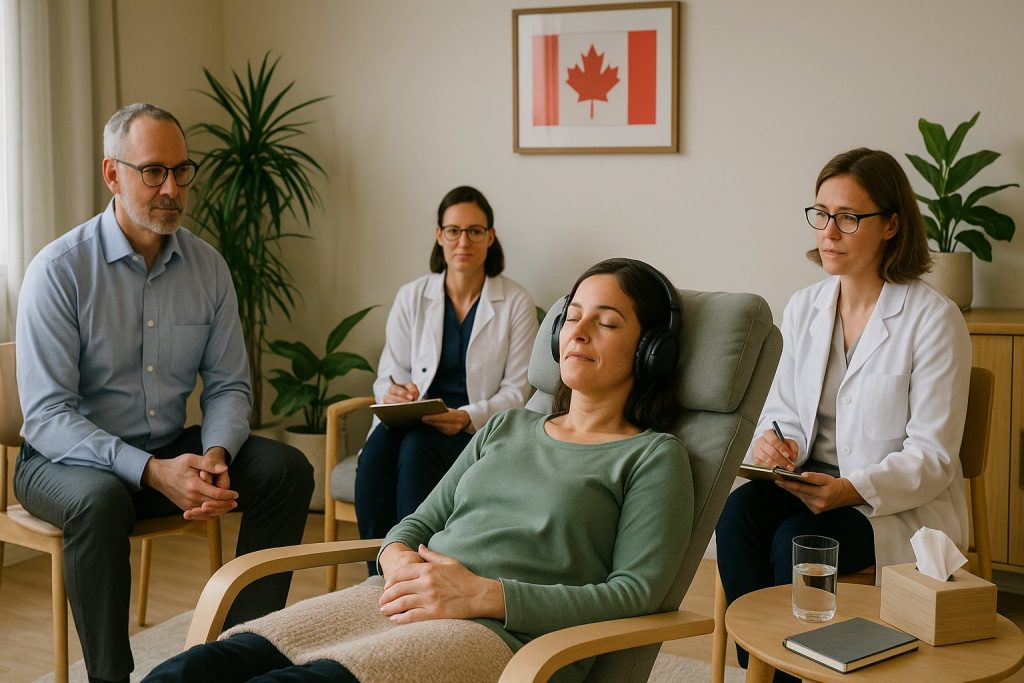
Choose your path, stay informed
The road from clinical trials to everyday access is rarely straight. MDMA has shown what’s possible, and psilocybin is close behind. As research grows, and with regulators in Canada and beyond paying attention, we could soon see mushrooms move from the grey market into the clinic—bringing new hope for mental health care.
Until then, curiosity and caution go hand in hand. Whether you’re exploring functional mushrooms for daily focus and immune support, or learning about the science of psychedelics, education is the first step.
At Path Supply, we’re here to guide you to help you make mindful choices. If you’d like to learn more, check out our functional mushroom capsules or read our blogs on microdosing and mindfulness.
Travellers around the world are increasingly booking trips that go far beyond the usual wellness getaway. From a psilocybin retreat in Jamaica to ayahuasca tourism in Costa Rica, these experiences are positioned at the intersection of science, adventure, and self-growth. Let’s check them out!
Why psychedelic retreats are trending
Across Canada and globally, people are seeking alternatives to conventional approaches for stress, focus, and growth. Academic research, including studies from Johns Hopkins University, highlights psilocybin’s potential to support well-being in clinical settings. Pair this science with a booming wellness travel industry, and you get mushroom tourism: experiences designed to help participants reset in nature, connect with community, and explore consciousness in a structured way.
For Canadians, where psilocybin remains a controlled substance under Health Canada, travelling abroad offers a legal path to explore.

Mushroom tourism destinations on the map
Jamaica: psilocybin retreats by the sea
Jamaica is one of the few countries where psilocybin mushrooms are unregulated. Retreats here, like MycoMeditations, offer week-long programs that include guided ceremonies, integration circles, and time to recharge by the ocean. Programs typically run $5,000–$10,000 USD, with facilitators emphasising safe dosing and professional guidance.
The Netherlands: legal psilocybin truffles
While dried mushrooms are banned, the Netherlands permits psilocybin truffles. Retreats outside Amsterdam combine clinical rigour with natural backdrops, offering multi-day programs with medical screening and therapeutic support. For Europeans and Canadians alike, the Netherlands is a hub for legal psychedelic retreats.
Costa Rica & Peru: ayahuasca tourism
Costa Rica has become a luxury hub for ayahuasca tourism, where rainforest retreats integrate Indigenous practices with resort-style amenities. Peru, considered ayahuasca’s birthplace, offers more rustic, tradition-driven ceremonies led by shamans in the Amazon and Sacred Valley. Both destinations attract travellers seeking cultural depth alongside spiritual exploration.
Mexico: rooted in tradition
In Oaxaca, visitors can participate in Mazatec mushroom ceremonies, rituals that helped bring psilocybin to global awareness decades ago. Today, retreats in Tulum or Sayulita blend Indigenous guidance with wellness-focused design, making Mexico one of the most culturally rich mushroom tourism destinations.
Portugal & Spain: decriminalized wellness journeys
Both countries have decriminalized personal possession, opening space for semi-legal retreats. From truffle ceremonies in Portugal to ayahuasca circles in Spain, travellers can explore plant medicine in Mediterranean settings that balance discretion with community care.

What travellers can expect
While styles differ, most psychedelic retreats share common features:
- Preparation: health screenings, orientation, and intention setting.
- Ceremonies: one to four sessions with psilocybin truffles, mushrooms, or ayahuasca.
- Integration: group sharing, coaching, or mindfulness practices to process insights.
- Wellness activities: yoga, meditation, hikes, or journaling to ground the experience.
Meals often follow dietary guidelines to support plant medicine work, and facilitators maintain low guest-to-guide ratios for safety. Retreats are not marketed as quick fixes but as structured journeys that combine science, tradition, and care.
Canadians at a crossroads: travel or stay home?
For Canadians intrigued by the rise of psychedelic retreats, travel offers legal access—but it also means long flights, high costs, and navigating unfamiliar systems. Retreats can cost $3,000–$10,000+, putting them out of reach for many.
That’s why Path Supply provides an accessible alternative. Our microdose capsules and functional mushroom supplements let you explore mushrooms safely and consistently, here at home. Functional mushrooms like Lion’s Mane and Reishi may support focus, resilience, and rest. No passport required.
We know storing loose mushrooms is unpredictable. That’s why our capsules, gummies, and chocolates are formulated for measured dosing, airtight freshness, and West-Coast good vibes. For more guidance, explore our Path Supply blog, where we break down everything from microdosing to legality.
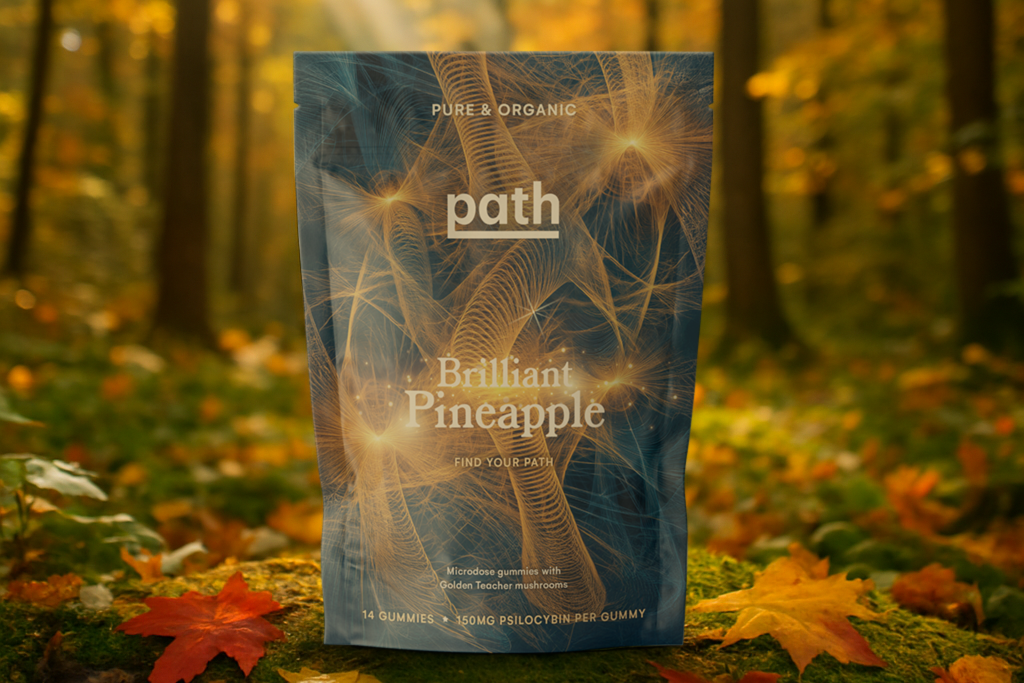
Adventure with grit, guidance with care
The global rise of mushroom tourism highlights a shared desire for growth, connection, and healing through nature’s tools. Whether you’re drawn to Jamaica’s beaches, Peru’s Amazon, or Portugal’s rolling hills, the trend reflects a cultural shift: people want experiences that nourish both body and mind.
If you’re not ready for international travel, you can still choose your path. Path Supply brings the spirit of adventure home, with products and education designed for safe, mindful exploration.
Curious about how microdosing psilocybin can elevate your mindfulness practice? Many Canadians are turning to microdosing not just for focus or creativity, but to deepen meditation, journaling, and self-reflection. By pairing small, lab-verified doses with mindful practices, you can open the door to greater clarity, emotional balance, and personal growth.
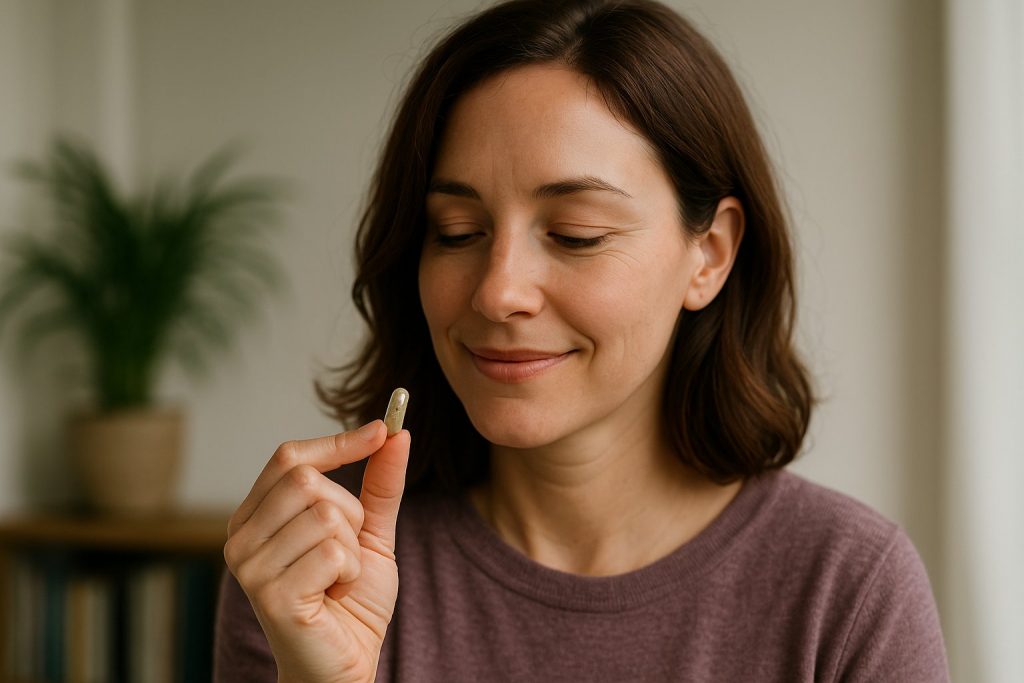
Why mindfulness and microdosing belong together
Microdosing involves taking a sub-perceptual dose of psilocybin (often around 100–300 mg) to experience subtle benefits without hallucinogenic effects. Unlike a full psychedelic journey, the goal isn’t to escape reality but to engage with it more intentionally.
Mindfulness practices such as meditation or yoga train you to notice thoughts without judgment and stay present. When combined with microdosing, they may help break rigid patterns, spark creativity, and encourage openness to new perspectives.
A University of Zurich study found that participants who combined psilocybin with meditation reported longer-lasting improvements in empathy, self-acceptance, and well-being compared to meditation alone. This suggests that psilocybin may act as a catalyst, helping to amplify the benefits of mindfulness.

Benefits of mindful microdosing
Creativity and flow
One of the most commonly reported benefits of microdosing is enhanced creativity. A field study in the Netherlands found that psilocybin microdoses improved both divergent (brainstorming) and convergent (problem-solving) thinking. Pairing microdosing with journaling or yoga allows you to capture and channel these insights into art, writing, or innovation at work.
For example, journaling after a microdose day can help ideas flow more freely, while yoga helps embody that creativity through movement. These practices turn fleeting sparks of inspiration into tangible growth.
Emotional balance
Mindfulness helps calm the nervous system, and psilocybin may add a gentle lift. Research shows microdosers often report reduced symptoms of anxiety and depression compared to non-microdosers. Many describe feeling lighter, more optimistic, and less reactive on microdose days, making challenges at work or home easier to handle.
Meditation and breathwork can deepen these effects by teaching you to observe emotions without becoming overwhelmed. Over time, this pairing builds greater emotional resilience.
Deeper self-reflection
Journaling during a microdose day helps surface patterns and clarify goals. Writing down your reflections in a microdosing journal is a powerful way to track changes in mood, focus, and creativity. Over weeks, you’ll see themes emerge — perhaps greater patience with others or new inspiration for personal projects.
This is where the real growth happens: subtle shifts turn into lasting personal development when you take the time to reflect and integrate them.
Mind-body connection
Yoga or mindful movement often feels more embodied under a microdose. Subtle sensory enhancement helps you savour the present moment, reconnect with your body, and enjoy the physical side of mindfulness. Even a short walk in nature can feel more vivid, grounding you in the here and now.
This heightened awareness of the body is a gentle reminder that wellness isn’t just about the mind, it’s about the whole self.

What a mindful microdosing routine looks like
A mindful microdosing routine doesn’t need to be complicated. Here’s an example of how it could fit into your week:
- Morning (microdose day): Take your microdose with breakfast. Path’s Elevate mushroom capsules offer a consistent 200 mg dose of Golden Teacher psilocybin, removing the guesswork. Follow with 10 minutes of meditation and a short yoga flow.
- Afternoon: Carry on with work or creative projects. Schedule a mindful break — maybe a walk in nature or a 5-minute breathing exercise.
- Evening: Journal about your mood, creativity, and insights. Some people also enjoy a restorative yoga session or a calming tea ritual. If you prefer something flavourful, the Awaken espresso chocolate bar delivers a smooth 200 mg dose in each square, blended with adaptogenic herbs for added focus.
A common protocol is “one day on, two days off,” which helps avoid tolerance. On off-days, continue meditation and journaling to integrate the benefits.
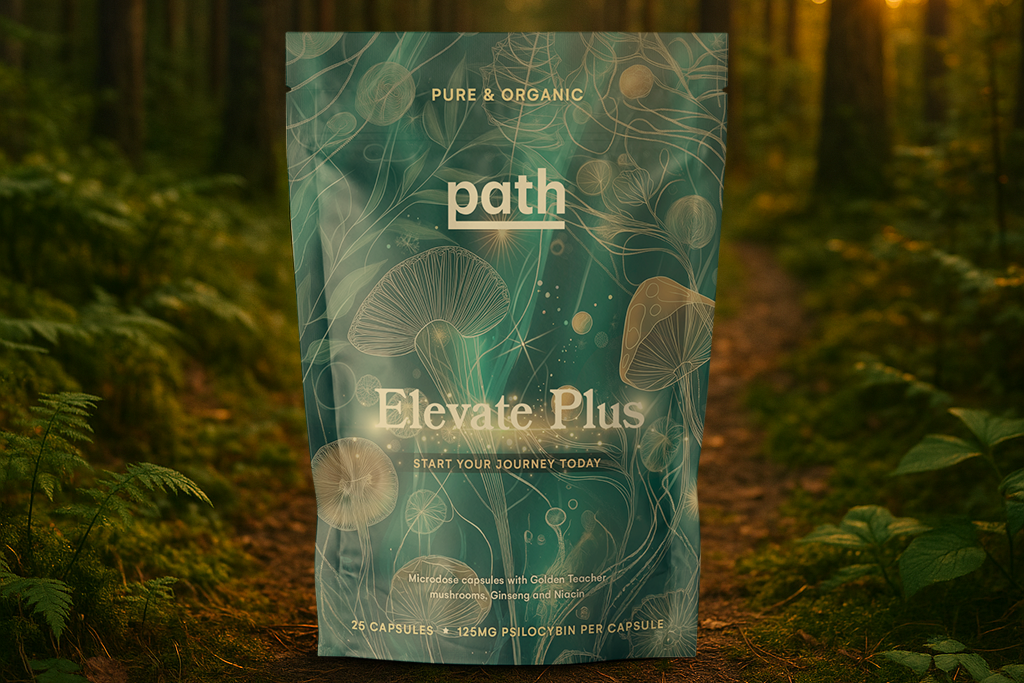
Growing with mindful microdosing
At its core, mindful microdosing is about choosing presence over distraction. It’s not a shortcut to enlightenment, but it can be a gentle guide — like a compass pointing you toward clarity, creativity, and self-compassion. By pairing psilocybin with meditation, yoga, or journaling, you’re building practices that align with a growth-minded, adventurous lifestyle.
So brew some tea, roll out your yoga mat, or open your journal. With a little help from psilocybin and a lot of curiosity, you just might discover new paths within yourself. Choose your path, and see where mindfulness takes you.
In today’s wellness world, it feels like mushrooms are everywhere: coffee blends, smoothies, even skincare. But when you’re staring at a shelf (or screen) of mushroom products, it’s natural to wonder: how do I choose the right mushroom supplement for me?
Each mushroom offers its own unique benefits. Lion’s Mane can support focus, Reishi helps with calm and sleep, Chaga is a powerhouse for immunity, and Cordyceps fuels natural energy. The question isn’t whether mushrooms belong in your wellness routine—it’s which one will help you most on your journey. Let’s find out!
Why functional mushroom supplements are trending in Canada
Functional mushrooms aren’t a fad. They’ve been part of Traditional Chinese Medicine and Indigenous practices for centuries. What’s new is the wave of scientific research showing how these fungi can support cognition, immunity, stress response, and endurance.
Canadians are especially drawn to functional mushroom capsules because they combine tradition with convenience. Instead of foraging or brewing teas, you can trust measured, shelf-stable doses that fit into a busy lifestyle.
According to the Health Council of Canada, functional mushrooms are increasingly recognized as supportive for brain health, immunity, and resilience.
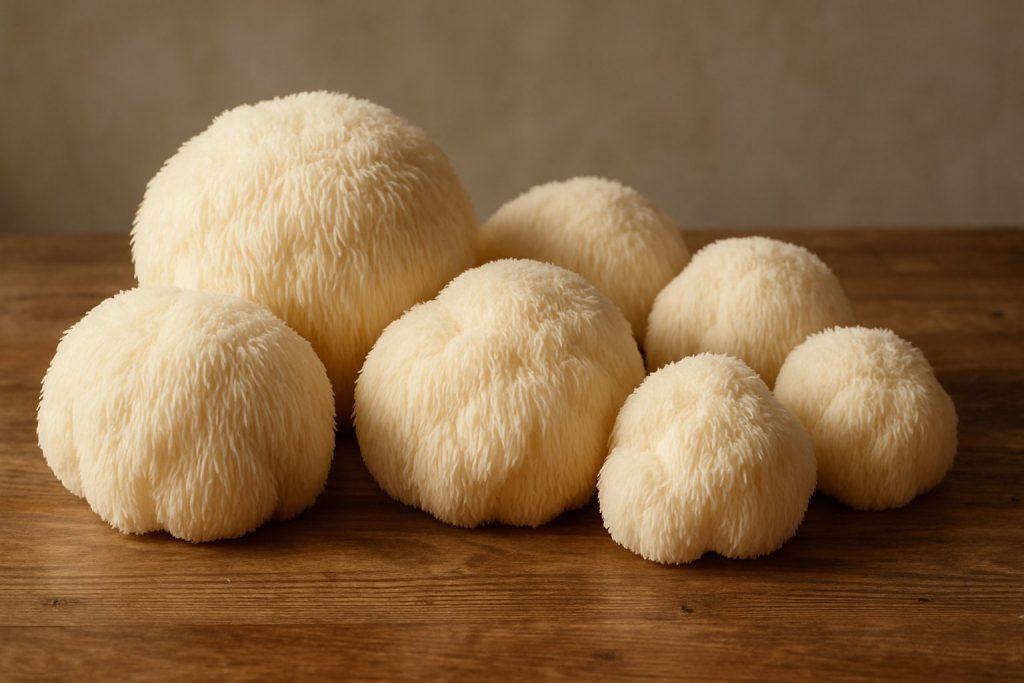
Lion’s Mane: for focus and cognitive clarity
If you want sharper memory, mental clarity, or creative flow, Lion’s Mane mushroom (Hericium erinaceus) may be your go-to. Research shows it can stimulate nerve growth factor (NGF), which supports brain health and cognitive function.
Best for:
- Professionals balancing demanding projects
- Lifelong learners or creatives
- Adventurers who want mental clarity on the trail
Many users describe Lion’s Mane as helping them enter a “flow state”—focused, but calm. Try Path’s Lion’s Mane mushroom capsules for 500 mg of organic, psilocybin-free support, lab-verified for quality.
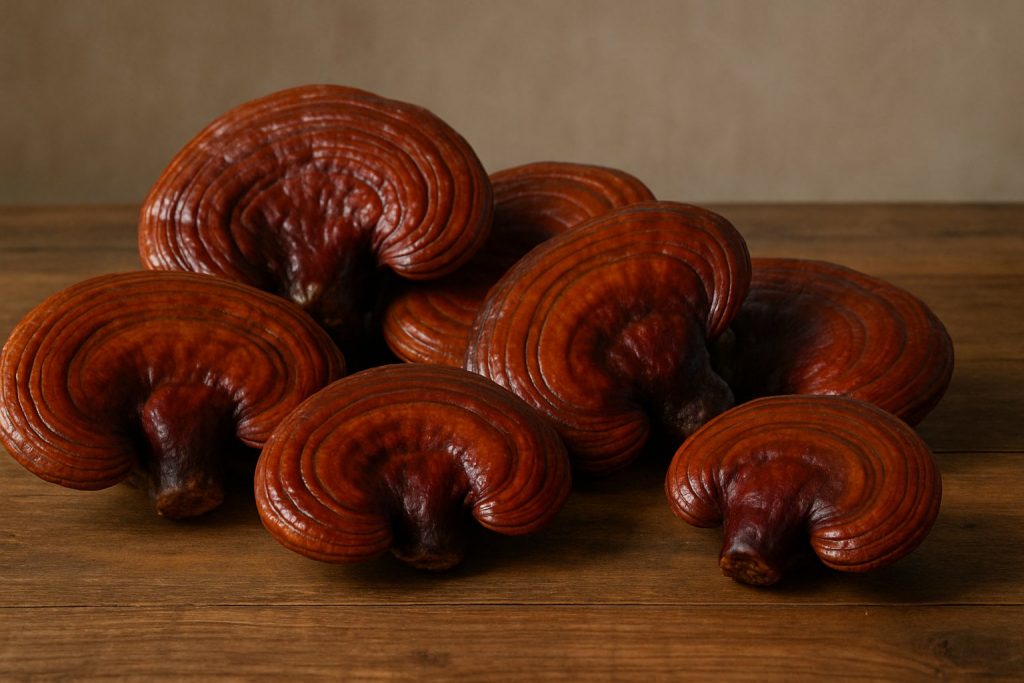
Reishi: for stress relief and restful sleep
Known as the “mushroom of immortality,” Reishi (Ganoderma lucidum) has been treasured for centuries for its adaptogenic qualities. Modern research suggests it may support stress resilience, immune function, and sleep quality.
Best for:
- People who struggle to unwind after long days
- Those looking to improve sleep naturally
- Anyone seeking balance and calm
Unlike quick fixes, Reishi works gently over time—helping your body adapt to stress and encouraging deeper rest. Add Reishi mushroom capsules to your evening routine for a calming end to the day.
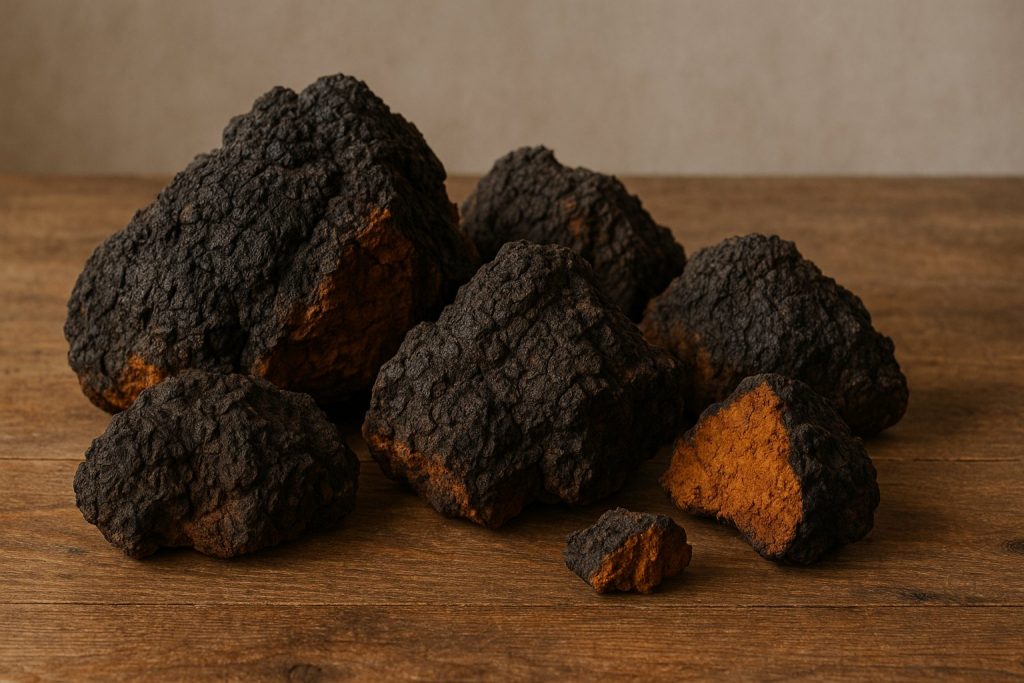
Chaga: for immune support and vitality
Growing on birch trees in northern forests, Chaga (Inonotus obliquus) is packed with antioxidants and beta-glucans. It’s traditionally brewed as a tea, but capsules make it easier (and less bitter) to enjoy its benefits.
Best for:
- Supporting immunity during seasonal changes
- Reducing oxidative stress with antioxidants
- Maintaining overall vitality
Chaga’s high antioxidant levels help combat oxidative damage and support long-term wellness. Skip the bitter tea and try Chaga mushroom capsules for an easy, clean daily dose.
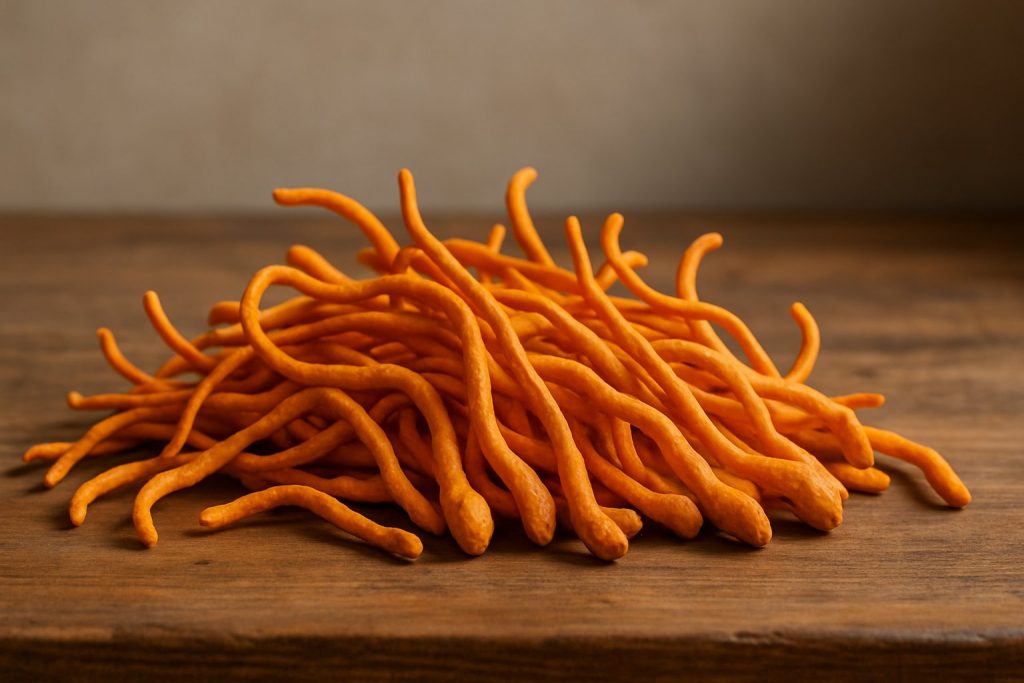
Cordyceps: for natural energy and endurance
Looking for a stamina boost without another cup of coffee? Cordyceps militaris is known for improving oxygen uptake and cellular energy production, making it a favourite among athletes and active lifestyles.
Best for:
- Runners, cyclists, and gym enthusiasts
- Anyone seeking steady, caffeine-free energy
- Outdoor adventurers wanting more endurance
Users often report smoother, more sustained energy with Cordyceps—not the jitters of caffeine. Take Cordyceps mushroom capsules in the morning or pre-workout for an energy lift.
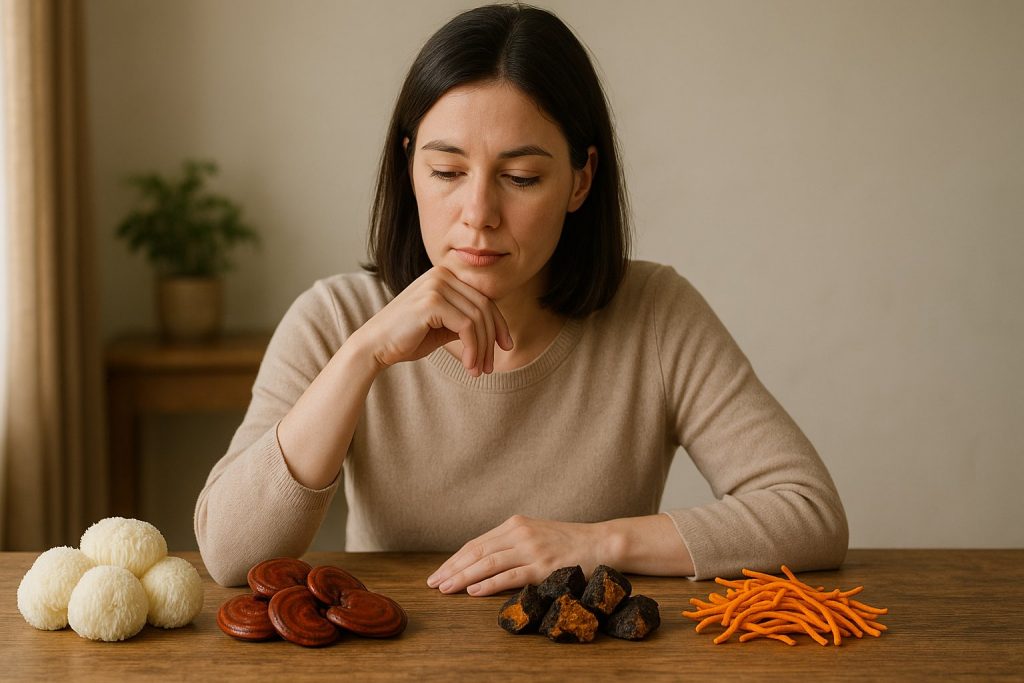
Comparing mushrooms: which path is yours?
| Mushroom | Main benefit | Best for | Path Supply option |
| Lion’s Mane | Focus & memory | Work, study, creativity | Lion’s Mane capsules |
| Reishi | Stress relief & sleep | Balance & relaxation | Reishi capsules |
| Chaga | Immunity & vitality | Daily wellness | Chaga capsules |
| Cordyceps | Energy & stamina | Athletes & active lifestyles | Cordyceps capsules |
Many people combine mushrooms for stacked benefits. For example, Lion’s Mane in the morning for focus and Reishi at night for calm.
Not all mushroom supplements are created equal. Here are key things to consider:
- Fruiting body extracts: More potent than mycelium powders.
- Organic and vegan: Mushrooms absorb their environment—organic ensures purity.
- Lab testing: Always look for third-party lab-verified results (Path posts these for every batch).
- Capsules vs powders: Capsules are measured and convenient; powders are versatile but less precise.

Choose your path with confidence
Choosing the right mushroom supplement is about more than following a trend. It’s about tuning into what your mind and body need most. Whether that’s sharper focus with Lion’s Mane, deeper calm with Reishi, stronger immunity with Chaga, or more energy with Cordyceps, there’s a mushroom for your path.
At Path Supply, we make your journey simple. Ready to start? Explore our full mushroom capsule collection and let nature’s wisdom guide your next step.
When standard antidepressants don’t bring relief, many Canadians begin exploring mental health alternatives. Two therapies in the spotlight are psilocybin-assisted therapy and ketamine treatment. Both are being studied for treatment-resistant depression, but they’re not the same journey.
Psilocybin sessions (still experimental in Canada) can open profound new perspectives, while ketamine therapy offers rapid but short-lived relief through legally available clinics. Here’s a clear-eyed comparison of psilocybin vs ketamine: how each works, the Canadian legal landscape, what the therapy experience is like, and what research says about their pros and cons.
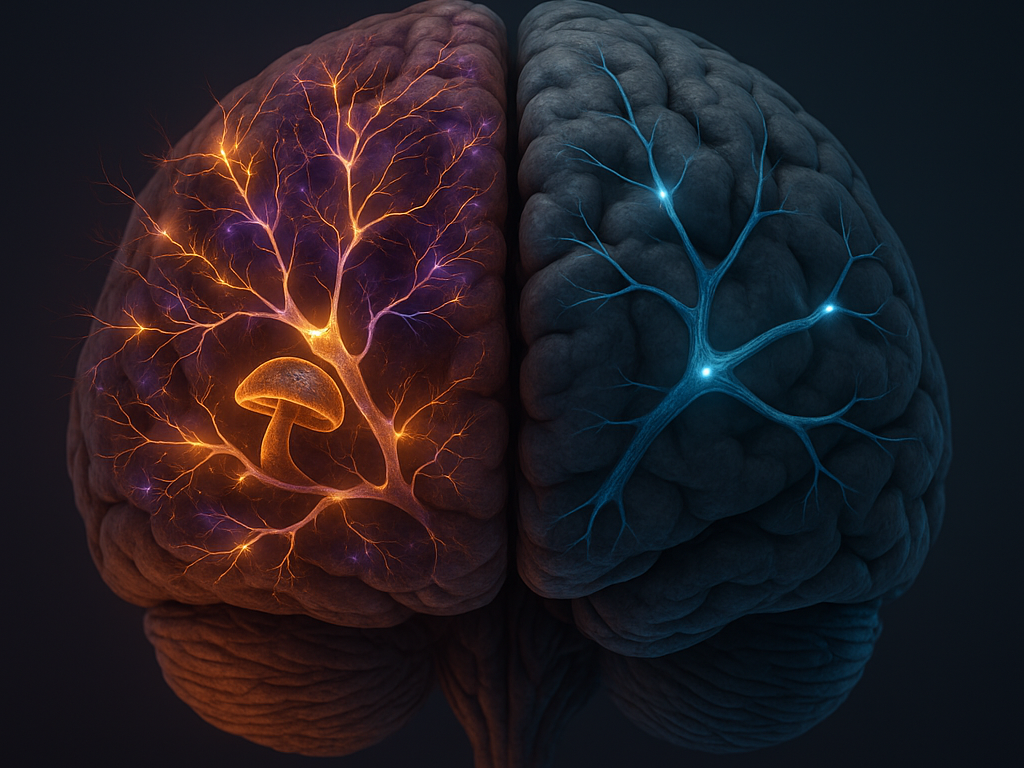
How psilocybin and ketamine work in the brain
Psilocybin, found in certain mushrooms, is turned into psilocin in the body. It gently taps into your brain’s serotonin system—the same system linked to mood and well-being. This can quiet down the “mental chatter” that keeps people stuck in negative loops, opening space for new perspectives and emotional breakthroughs, especially when paired with therapy.
Ketamine takes a different route. Instead of serotonin, it activates your brain’s glutamate system. Picture it like watering a dry forest—ketamine sparks a burst of activity that helps the brain grow fresh connections more quickly. This is why many people feel relief within hours, even when other treatments have taken weeks.
In short: psilocybin may offer a deep reset with lasting effects, while ketamine is more like a fast-acting boost. Both give the brain a chance to step out of old patterns and into new possibilities.
Legal status in Canada
Here’s where the paths diverge:
- Ketamine: Available now. Health Canada approved an esketamine nasal spray for treatment-resistant depression in 2020. Dozens of clinics across Canada offer ketamine infusions or nasal therapy under medical supervision.
- Psilocybin: Still experimental. Psilocybin is a controlled substance in Canada, but it’s being studied in psilocybin clinical trials at institutions like CAMH. As of 2024, only a limited number of patients have received legal access through these routes.
In short: ketamine is a therapy Canadians can access today, while psilocybin is only available in regulated studies or on a case-by-case exemption basis.
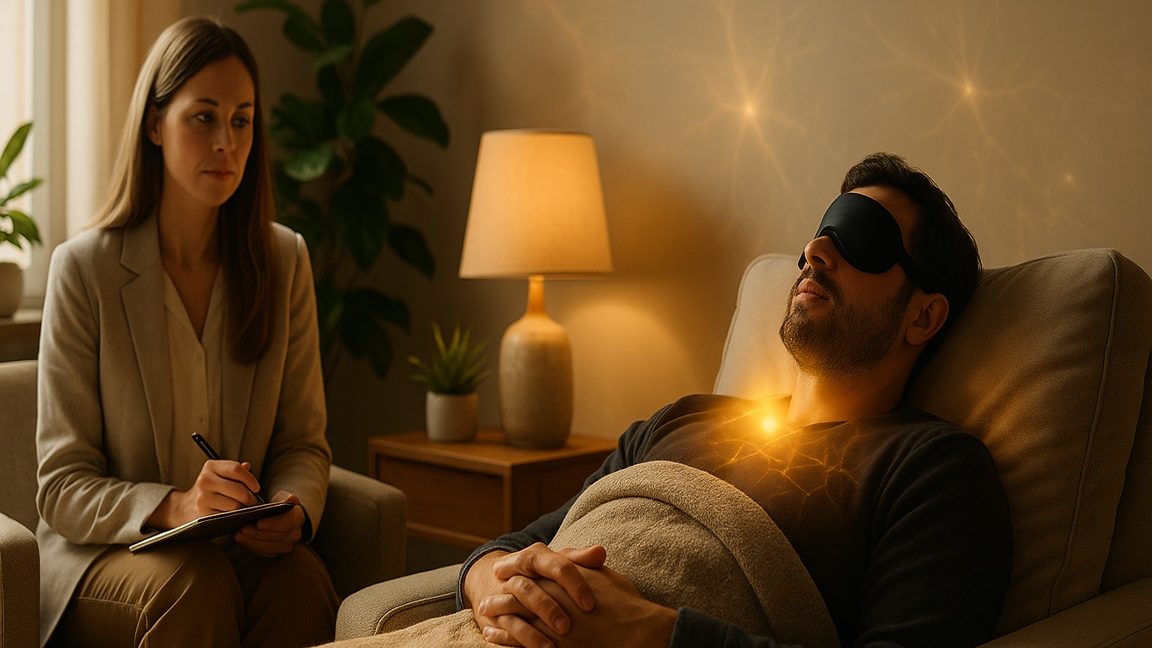
What a treatment session looks like
Psilocybin therapy:
- Involves careful preparation with trained therapists
- A session lasts 4–6 hours in a calm, supportive setting
- Patients often wear eyeshades, listen to music, and focus inward
- Follow-up integration sessions help process the experience
Ketamine therapy:
- Usually delivered as a series of shorter sessions (40–120 minutes each)
- Administered by IV infusion, injection, or nasal spray in a clinic setting
- Effects begin within minutes, with a dreamlike, dissociative state
- Relief is often noticeable within hours, though it typically fades in days to weeks
Both therapies emphasise “set and setting”. The mindset you bring and the environment around you are crucial for positive outcomes.
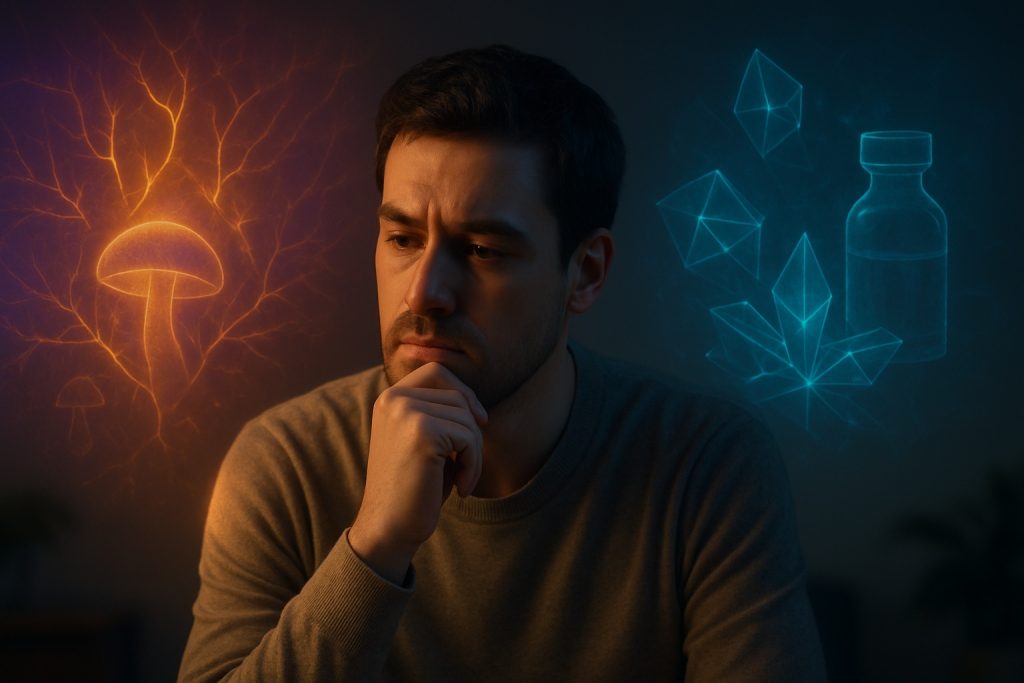
Pros and cons of each approach
Psilocybin
Pros:
- Promising research shows sustained improvements lasting weeks to months after just one or two sessions
- Can catalyse meaningful emotional or spiritual breakthroughs
- Low physiological risk and non-addictive when supervised
Cons:
- Still illegal outside trials or exemptions in Canada
- Experiences can be emotionally intense, sometimes overwhelming
- Evidence base is still growing; long-term outcomes remain under study
Ketamine
Pros:
- Fast-acting—relief can come within hours, ideal in crisis situations
- Available now in Canada through clinics
- Research-backed safety profile in medical settings
Cons:
- Benefits usually short-lived without repeat treatments
- Multiple sessions can be costly and time-consuming
- Side effects may include nausea, dissociation, or blood pressure spikes
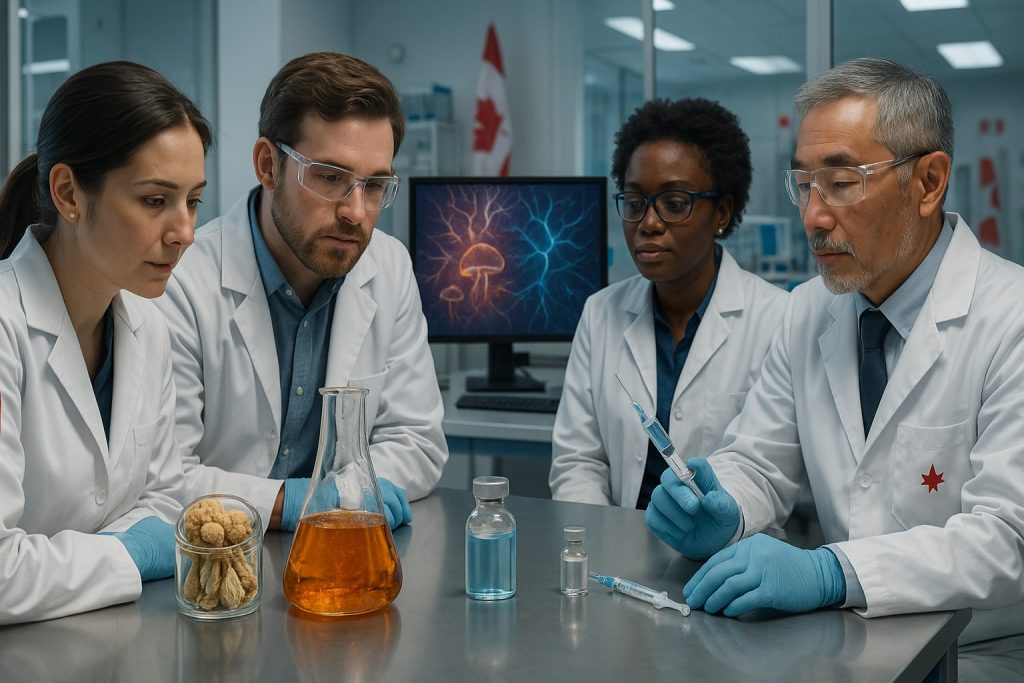
Canadian research and clinics leading the way
Canada is at the forefront of this exploration:
- CAMH in Toronto is running government-funded trials testing psilocybin for depression, including whether the psychedelic experience itself is necessary for benefits.
- Numinus and Mindspace clinics in Montreal and Vancouver are pioneering ketamine-assisted therapy and have also facilitated psilocybin therapy through Health Canada’s Special Access Program.
- Innovative studies like the Montreal Model combine ketamine with psychotherapy and soothing settings, showing longer-lasting results than ketamine alone.
These efforts are pushing psychedelic therapy from fringe to credible, evidence-based practice.
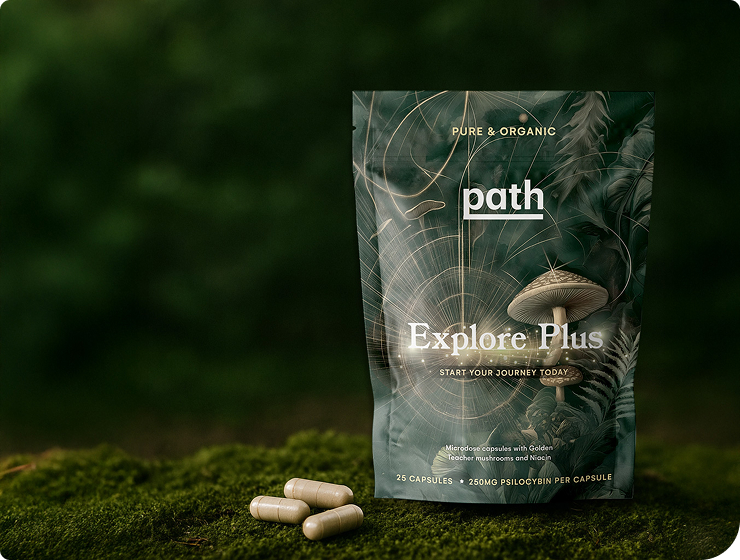
Where microdosing fits in
Full therapy sessions aren’t the only way Canadians are exploring psilocybin. Microdosing—taking very small, sub-hallucinogenic amounts—has become a gentle option for wellness-seekers. While science is still emerging, many adults report improved mood, focus, and creativity.
At Path Supply, we make it simple to explore this approach responsibly. Our psilocybin microdose capsules and edibles offer consistent dosing. No need to worry about grinding, measuring, or storing loose mushrooms. For those who aren’t eligible for clinical psilocybin therapy, microdosing provides a mindful, everyday way to see how psilocybin might support your path.
Final take
When comparing psilocybin vs ketamine, it’s not about which therapy “wins,” but how each might serve different needs. Ketamine is a rapid-acting option available now through Canadian clinics, though its benefits often require ongoing treatments. Psilocybin, still in trials, shows promise for longer-lasting effects after only a few sessions—but access is currently limited.
For Canadians curious about psychedelic therapy, the future is bright. With ongoing studies at CAMH and forward-thinking clinics like Numinus, more options are on the horizon. In the meantime, microdosing offers a safe, everyday entry point into psilocybin’s potential.
Whichever path you choose, do so with curiosity, care, and the right support. Healing is an adventure—and mushrooms can help guide the way. Choose your path.
If you’re looking for a brain booster that aligns with a natural, adventurous lifestyle, Lion’s Mane (Hericium erinaceus) deserves a spot on your radar. This shaggy, white mushroom is celebrated as a nootropic mushroom – a natural supplement that may help with memory support, mental clarity, and sustained concentration. At Path Supply, we see it as a psilocybin-free way to fuel your mind for everything from mountain trails to big project deadlines.
Unlike psychedelic varieties, Lion’s Mane contains no psilocybin, so it’s completely non-intoxicating. Yet, emerging research shows it may help support nerve growth and brain health, making it one of nature’s most intriguing focus supplements.
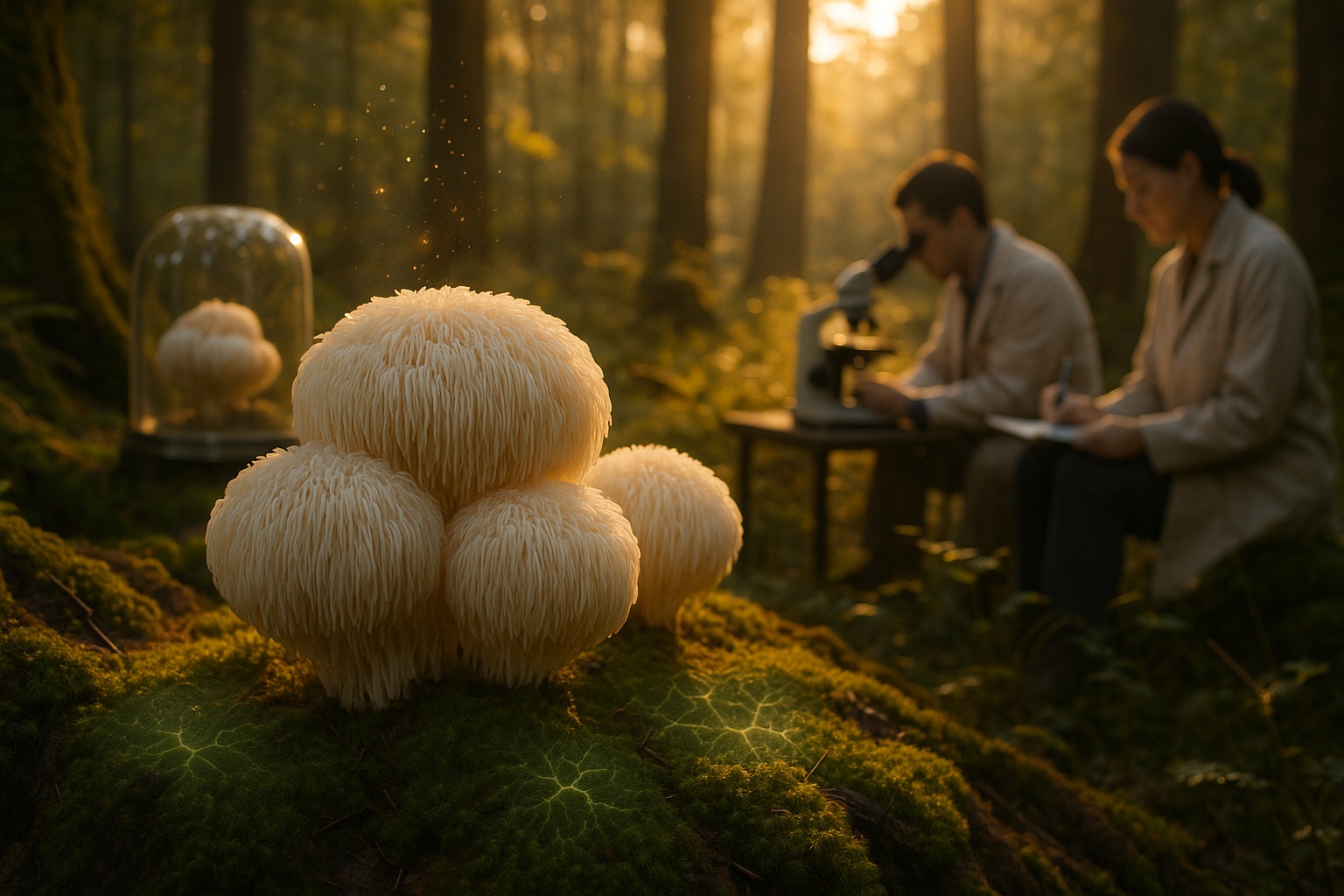
The science behind Lion’s Mane benefits
Lion’s Mane contains bioactive compounds – including hericenones and erinacines – that have been studied for their potential to stimulate nerve growth factor (NGF) in the brain. NGF plays a role in the growth and maintenance of neurons, which are vital for learning, memory, and cognitive resilience.
A 2013 animal study in the Journal of Restorative Neurology and Neuroscience reported that Lion’s Mane supplementation enhanced hippocampal neurogenesis in aged mice, leading to improvements in memory and recognition tasks.
In a small, double-blind, placebo-controlled trial conducted in Japan, adults aged 50–80 with mild cognitive impairment took 3 grams of Lion’s Mane mushroom powder daily for 16 weeks. Those in the Lion’s Mane group showed significant improvements on cognitive function tests compared to the placebo group. However, when supplementation stopped, their scores declined back toward baseline within four weeks—highlighting that ongoing use may be necessary to maintain benefits.
For anyone seeking a natural brain booster to help sharpen focus during work or creative pursuits, Lion’s Mane offers a promising, plant-based option – no jitters, no crash.

How Lion’s Mane supports focus and memory
Lion’s Mane’s benefits can be broken down into a few key areas:
Cognitive clarity
By supporting healthy NGF levels, Lion’s Mane may help the brain process information more effectively. This could mean clearer thinking during complex tasks – ideal for professionals, creatives, or anyone navigating demanding mental challenges.
Memory support
Studies suggest regular supplementation may assist with recalling information more easily. Whether you’re learning a new skill or simply want to remember where you left your keys, this nootropic mushroom could help keep those neural pathways in good shape.
Mood and focus
Some research indicates Lion’s Mane may help reduce mild anxiety and depressive symptoms, which often interfere with concentration. Better mood can translate into better focus – a win for both productivity and overall well-being.
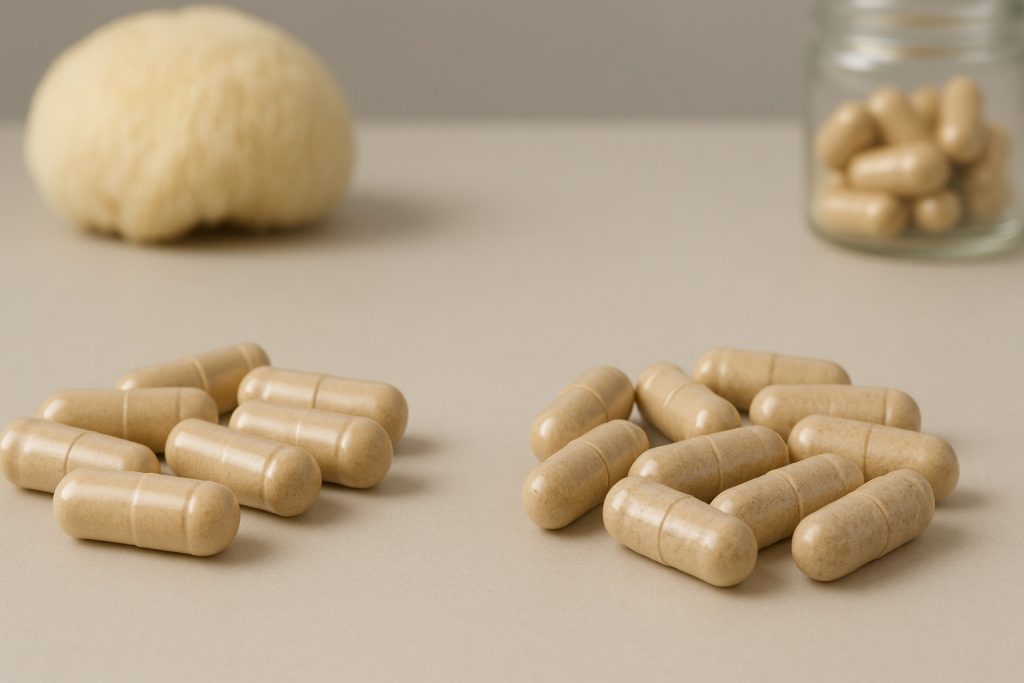
Why quality matters: not all Lion’s Mane is equal
With the rise in popularity of focus supplements, the market is full of options – but not all are created with the same care. Quality factors include:
- 100% fruiting body extract – The most potent Lion’s Mane benefits come from the mushroom’s fruiting body, not filler mycelium.
- Lab verification – Independent testing ensures purity and potency, so you get what’s on the label.
- Organic and eco-conscious sourcing – Choosing brands that align with sustainable practices supports both your health and the planet.
At Path Supply, our psilocybin-free Lion’s Mane capsules are made from organic fruiting bodies, lab-tested for quality, and encapsulated for convenience – so you can enjoy consistent dosing without the hassle of storing or preparing raw mushrooms.
Backed by nature, guided by science
The appeal of Lion’s Mane isn’t just in the tradition; it’s in the growing body of scientific evidence. Health Canada recognises that functional mushrooms like Lion’s Mane are generally safe for consumption, provided they are sourced and prepared properly. By choosing lab-verified products, you’re ensuring your supplement delivers the benefits you’re seeking – and nothing you don’t.
For further reading, you can explore Health Canada’s guidance on natural health products and a peer-reviewed article on Lion’s Mane and cognitive health.
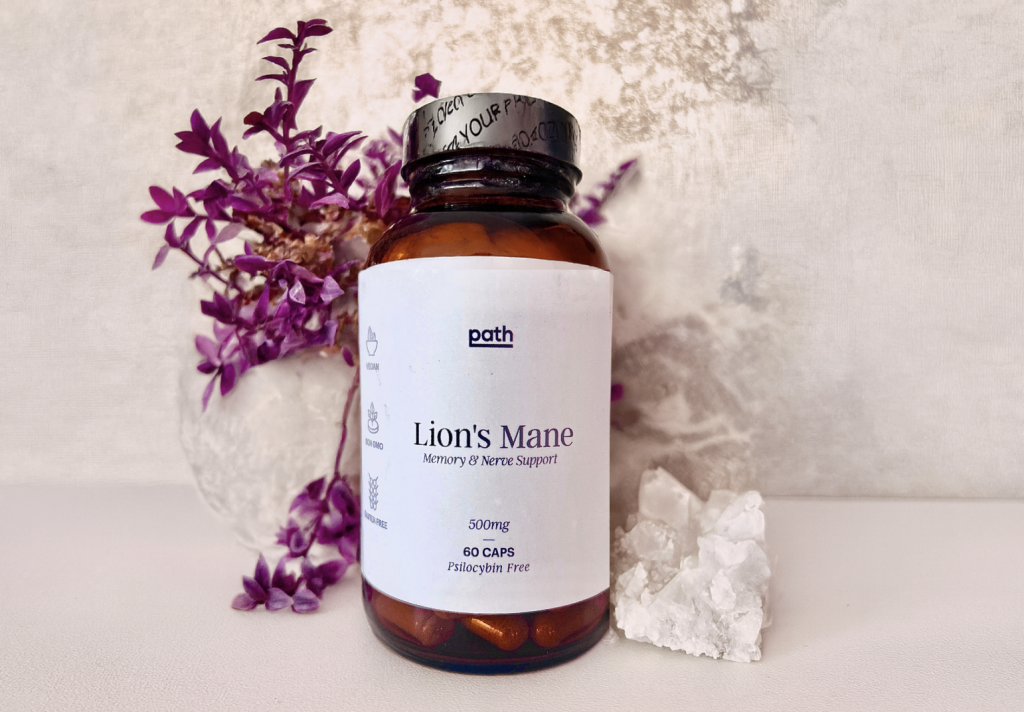
Choose your path to sharper focus
Lion’s Mane is more than a supplement – it’s a tool for personal growth, whether you’re tackling a challenging hike, a creative project, or the day-to-day demands of life. By choosing a nootropic mushroom that’s organic, lab-tested, and thoughtfully sourced, you’re investing in both your mental clarity and long-term brain health.
If you’re ready to experience the potential of this natural brain booster, check out our Lion’s Mane capsules – your adventure in focus and memory support starts here.
There’s something timeless about steeping a warm mug of tea. Add in the measured benefits of psilocybin, and you have a ritual that blends wellness, mindfulness, and adventure. Magic mushroom tea offers a gentler onset than eating dried mushrooms, making it a favourite among people seeking a more comfortable, intentional experience. At Path Supply, we believe in preparing it safely—and in ways that keep your dosing consistent and your path clear.
Before we get into the how, it’s important to remember: in Canada, psilocybin remains a controlled substance without a legal exemption. Always ensure you understand the Canadian government’s guidelines before making or consuming psilocybin products. This guide is for educational purposes and encourages responsible use.
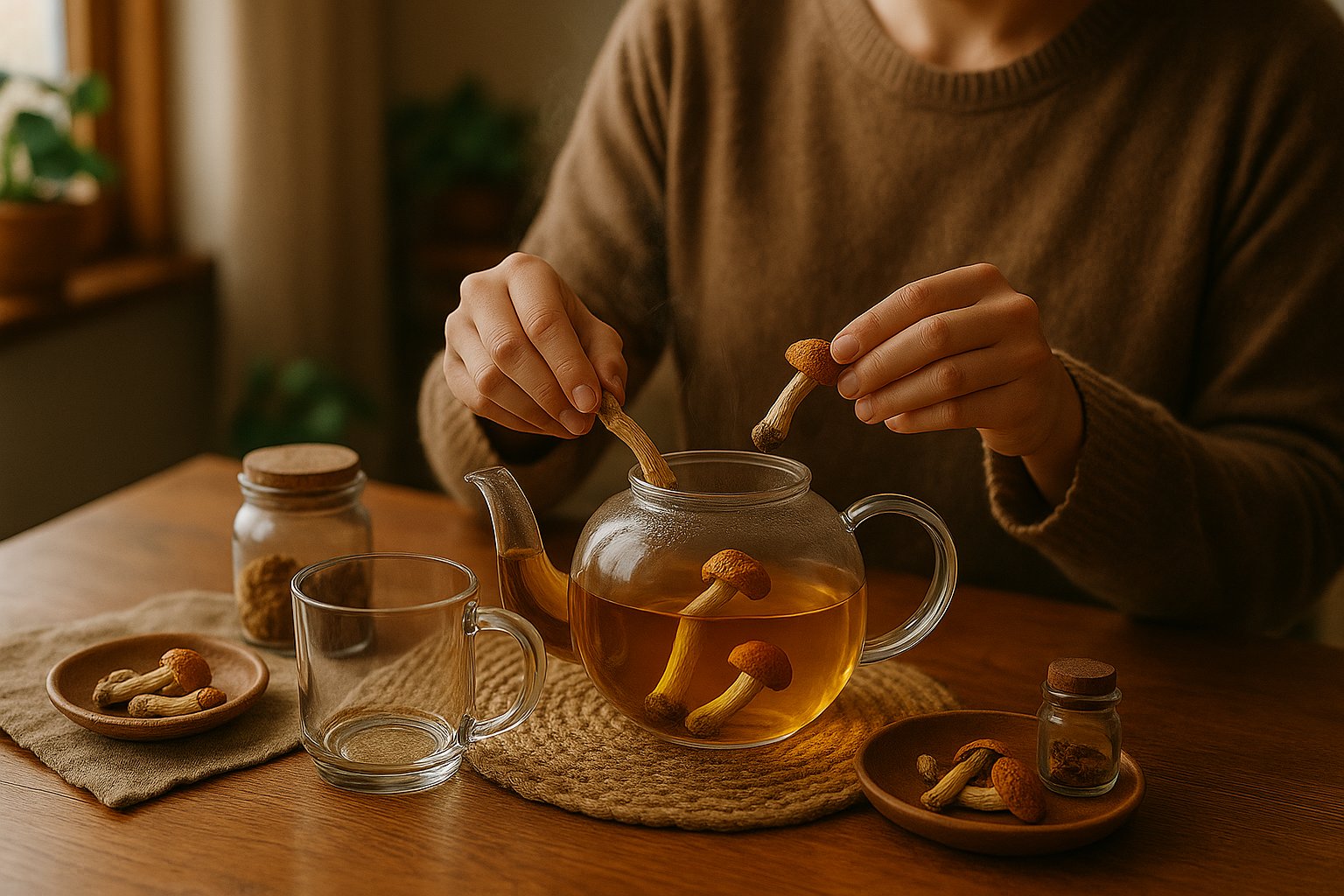
Why choose tea over eating dried mushrooms?
Drinking psilocybin in tea form can:
- Support smoother digestion – The heat helps break down some of the mushroom material, which may reduce stomach discomfort.
- Allow for a faster onset – Effects are often felt sooner than chewing dried mushrooms.
- Offer creative flavour options – Herbal blends, honey, and spices can enhance the experience.
That said, making tea from loose mushrooms can be tricky. Potency varies between caps, stems, and even different parts of the same batch. That’s why many people choose our microdose products—like our Elevate microdose capsules or Awaken magic mushroom espresso chocolate—for consistency, convenience, and shelf stability.
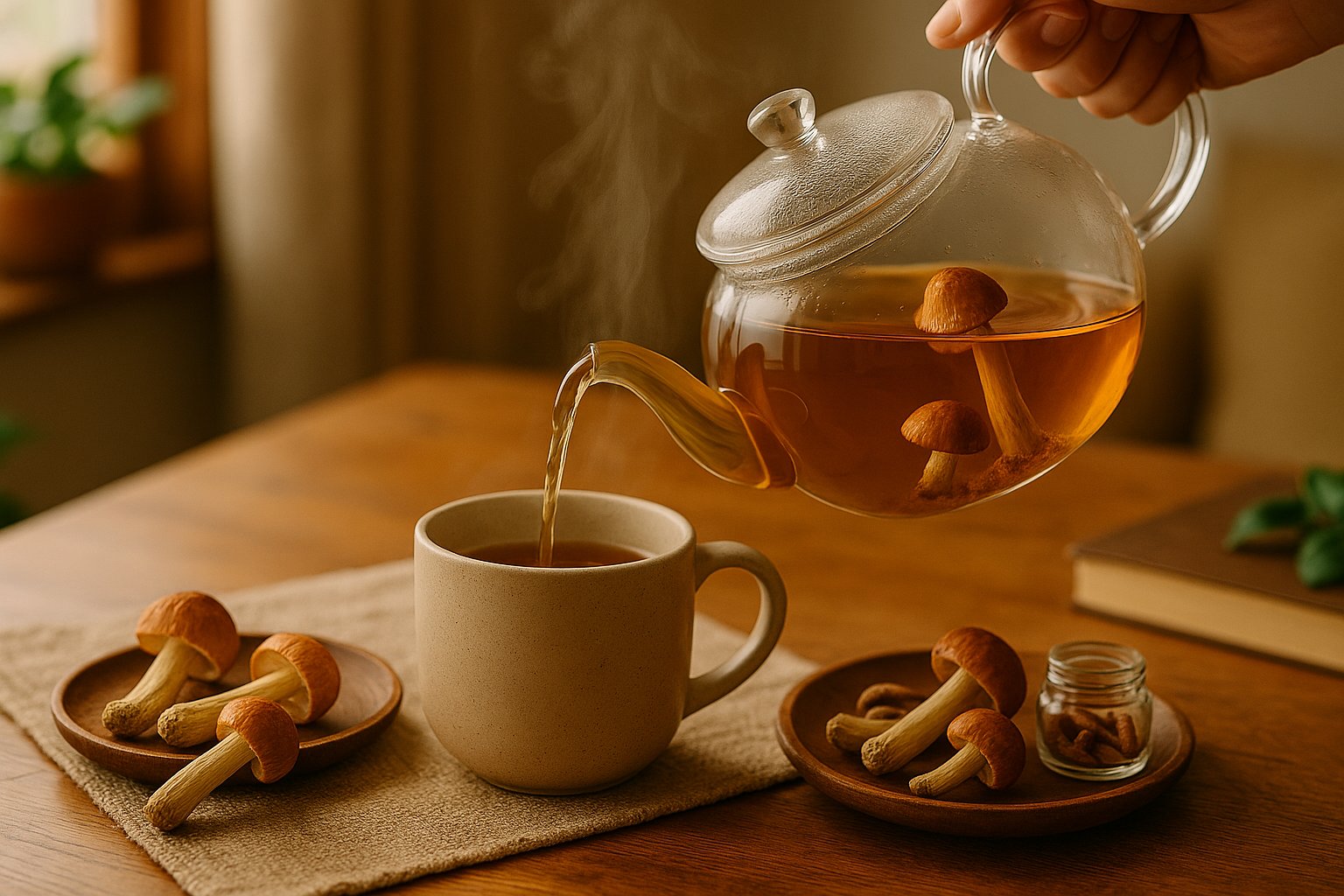
The safety essentials
Know your dose
Potency inconsistency is the number-one challenge with loose mushrooms. We create blends from large, homogenized batches so every capsule or chocolate square has the same psilocybin content. If you’re using loose mushrooms for tea, weigh them carefully with a precise scale.
Mind your setting
Choose a safe, comfortable environment. Whether you’re in a quiet cabin on the coast or your own living room, create a space that supports the kind of experience you want.
Stay hydrated and nourished
Have water and light snacks ready. Tea can be hydrating, but psilocybin journeys—micro or macro—still require you to take care of your body.
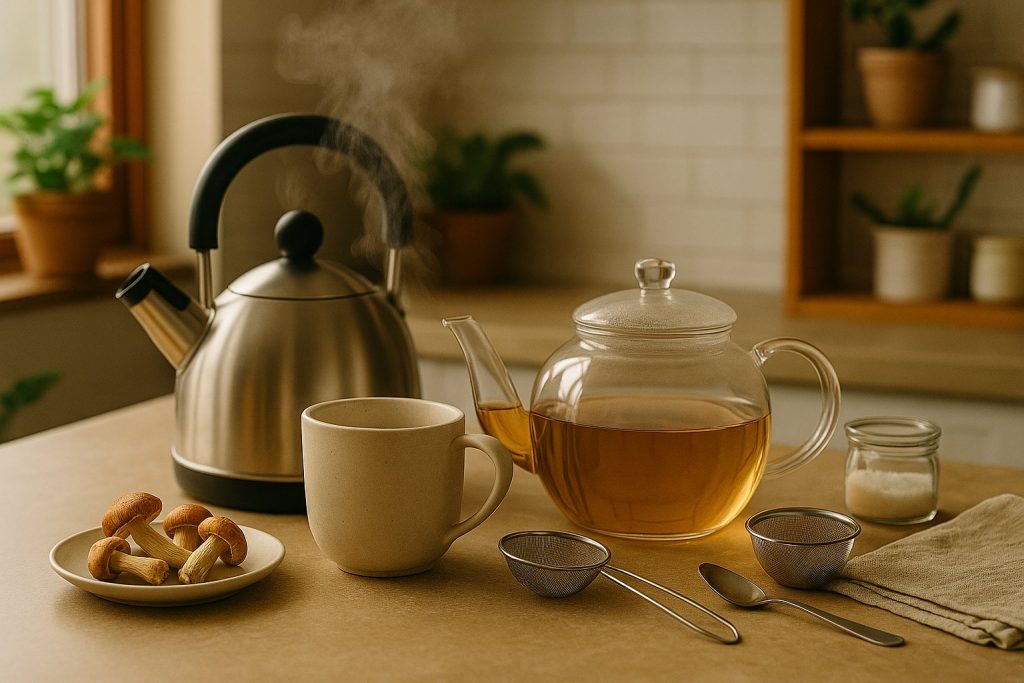
How to brew magic mushroom tea: step-by-step
Ingredients:
- Your measured psilocybin dose (loose mushrooms, capsules, or powdered form)
- 250–300 ml hot water (not boiling)
- Optional: ginger, chamomile, peppermint, honey, or lemon
Method:
- Prepare the mushrooms
If using loose mushrooms, chop them finely to increase surface area. If using capsules, you can open them and pour the powder directly into the water. For chocolate, melt gently in warm water or milk before combining with tea. - Heat the water
Bring water to just below boiling (around 80–90°C). Boiling water can degrade psilocybin, reducing potency. - Steep gently
Place mushrooms or powder into a tea infuser, French press, or directly into the mug. Steep for 10–15 minutes, stirring occasionally. - Enhance flavour and digestion
Add ginger for a warming, stomach-settling effect, or lemon to brighten the flavour. - Strain and sip
Strain solids if desired. Sip slowly, noting onset effects over the next 20–40 minutes.
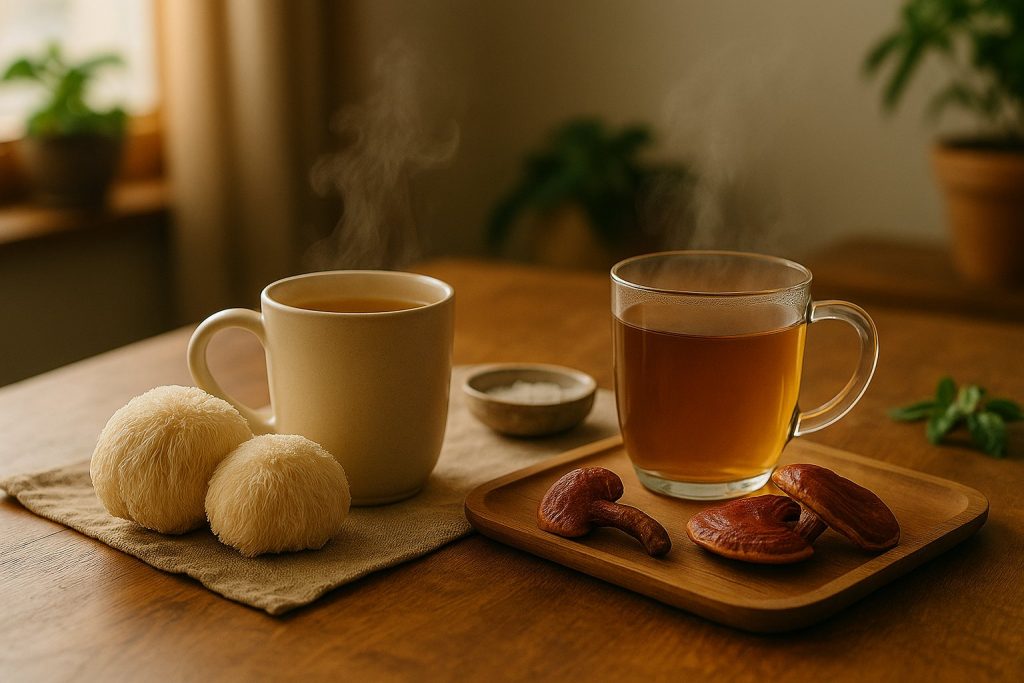
Beyond psilocybin: functional mushroom teas
If you love the idea of mushroom tea but want a psilocybin-free option, functional mushrooms like Lion’s Mane and Reishi can be brewed into rich, earthy infusions. These may support focus, relaxation, and immune health without any psychoactive effects.
Responsible, mindful, adventurous
Brewing magic mushroom tea is more than a recipe—it’s a ritual. Whether you’re steeping a microdose for a creativity boost or exploring a deeper journey, do it with care, respect, and a sense of adventure. At Path Supply, we’re here to make that path smoother, more consistent, and more enjoyable, so you can focus on what really matters: the experience.
For more on safe microdosing and mushroom wellness, explore our blog library and let us help you choose your path.
If you’re wired but tired, you’re not alone. Canadians are increasingly turning to natural remedies that help them feel calmer, sleep better, and stress less—without pharmaceuticals. Enter Reishi for sleep and relaxation: a calming functional mushroom with ancient roots and modern wellness benefits.
Known as the “chill mushroom,” Reishi (Ganoderma lucidum) has been used for centuries in Traditional Chinese Medicine to soothe the spirit and promote longevity. Today, science is catching up, and this powerful adaptogen is showing real promise in helping folks manage stress and get deeper rest.

What is Reishi—and why do people call it the “chill mushroom”?
Reishi is a woody, red-capped fungus that grows on hardwood trees. In herbal traditions, it’s revered as the “mushroom of immortality”—but don’t let that lofty title throw you off. Reishi isn’t mystical, it’s functional. It works gently with your body to support calm, immune resilience, and recovery from stress.
As an adaptogen, Reishi helps your body find its balance when things feel out of whack. That might mean lowering stress hormones like cortisol, supporting your adrenal system, or helping your nervous system shift out of “fight or flight” mode. Many people say it helps them feel more grounded—especially in the evenings, when they want to power down from the day.
Reishi for stress: balance without burnout
Stress hits hard. Whether it’s looming deadlines, nonstop group chats, or trying to get the kids to bed on time, modern life is loaded with micro-stressors. Reishi may help your body cope with that load.
Clinical research suggests Reishi can support the adrenal glands and reduce cortisol levels—the hormone most tied to stress. It also has antioxidant properties that help protect cells from the damage stress can cause. Translation? It helps your body stay balanced under pressure.
And here’s the beauty: unlike stimulants, Reishi doesn’t amp you up. Instead, it helps regulate your mood and energy naturally. It’s not about pushing through. It’s about riding life’s waves with more ease and less tension.

Why Reishi for sleep just makes sense
You can’t sleep if your brain won’t stop buzzing. And that’s where Reishi for sleep really shines.
Reishi has been shown to support deeper, more restful sleep by interacting with your body’s GABA receptors—neurotransmitters that help calm the nervous system. In studies, Reishi extracts have been linked to reduced sleep latency (falling asleep faster), more time spent in restorative non-REM sleep, and fewer nighttime awakenings.
And unlike melatonin, which directly signals your body to sleep, Reishi works more holistically—helping you wind down without knocking you out. That makes it a favourite among people who want to build healthier evening routines without relying on heavy sleep aids.

The nighttime ritual you didn’t know you needed
One of the best ways to use Reishi is as part of your wind-down ritual. About an hour before bed, try taking Reishi in capsule form or sipping it in a warm beverage. Combine it with a screen break, some soft lighting, and maybe even a little journaling. The goal is to send your body a signal: “Hey, it’s okay to relax now.”
Want to stack it for extra calm? Many people pair Reishi with magnesium glycinate or L-theanine (an amino acid found in green tea). Together, they work synergistically to ease both the mind and body into a more relaxed state—setting the stage for sleep to come naturally.
Reishi vs. melatonin: what’s the difference?
Melatonin can help with jet lag or an occasional restless night, but high doses often leave folks feeling groggy. Some people also report vivid dreams or hormonal imbalances after long-term use.
Reishi for sleep offers a gentler, more sustainable path. Because it doesn’t override your body’s natural rhythms, you’re less likely to experience side effects or dependency. It’s a long-game solution, not a quick fix. And that aligns with how most folks in the Path community want to approach wellness: naturally, gradually, and with intention.

Final thoughts: choose your calm, choose your path
At Path, we’re all about simplifying your wellness stack without compromising quality. Our Reishi Mushroom Capsules contain 500 mg of pure, organic dose of Reishi mushrooms—no psilocybin, no fillers.
Whether you’re navigating a high-stress job, parenting chaos, or simply looking for a more grounded way to end the day, Reishi offers a natural, evidence-backed tool. It helps you rest easier, stress less, and stay present for the moments that matter.
So go ahead—choose your path to better sleep, fewer worries, and those West-Coast good vibes. The chill mushroom’s got your back.